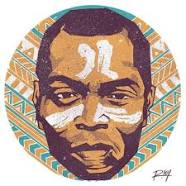.jpg) .
.
Olufela Olusegun Oludotunj Ransom-Kuti, known professionally as Fela Kuti, Fela Anikulapo Kuti, or simply Fela was born on the 15th of October 1938 and died on the 2nd of August 1997,aged 59 years. Fela was born in Abeaokuta, Nigeria, north of Lagos, Fela's family was fairly middle class as well as politically active. His father was a pastor (and talented pianist), his mother active in the anti-colonial, anti-military, Nigerian home rule movement. His brothers, Beko Ransom-Kuti and Olikoye Ransom-Kuti, both medical doctors, are well know in Nigeria. Fela is a first cousin to the Nigerian writer and Nobel laureate Wole Soyinka, the first African to win the Nobel Prize for Literature.
.jpg)
Fela experienced politics and music in a seamless combination. His parents, however, were less interested in his becoming a musician and more interested in his becoming a doctor, so they sent him off to London in 1958 for what they assumed would be a medical education; instead, Fela registered at Trinity College's school of music. Tired of studying European composers, Fela formed his first band, Koola Lobitos, in 1961, and quickly became a fixture on the London club scene. He returned to Nigeria in 1963 and started another version of Koola Lobitos that was more more influenced by the James Brown - style singing of Geraldo Pina from Sierra Leone. Combining this with elements of traditional high life and jazz, fela dubbed this intensely rhythymic hybrid "Afro-beat", partly as critique of African performers whom he felt had turned their backs on their backs on their African musical roots in order to emulate current American pop music trends.
.jpg)
In 1969, Fela brought Koola Lobitos to Los Angeles to tour and record. they toured America for about 8 months while using los Angeles as their home base. While in L.A., Fela hooked up with a friend, Sandra Isidore, who introduced him to the writings and politics of Malcolm X, Eldridge Cleaver (and by extension the Black Panthers). Impressed at what he had read, Fela had a change mentally in politics and some were changes were in order; firstly, he changed the name of the band from Koola Lobitos to Nigeria 70; secondly, the music became more politically explicit and critical of the oppression of the powerless worldwide. Fela and his band had an issue with their promoter which led to the band being charged with working without work permits. Although, before returning to the country, Fela and the band were able to gather money and recorded some new songs in L.A. which came to be what will be known as the '69 Los Angeles Session, an indication of a maturing sound and the rancous, propulsive music that was to mark Fela's career. Afrobeat's combination of blaring horn sections, antiphonal vocals, Fela's quasi-rapping pidgin English, and percolating guitars, all wrapped up in a smoldering groove (in the early days driven by the band's brilliant drummer Tony Allen) that could last nearly an hour, was an intoxicating sound. Once hooked, it was impossible to get enough.
.jpg)
First episode into the life one of Africa's greatest men.
Next episode we shall take a peep into his upon returning to Nigeria.
Hi! I am a robot. I just upvoted you! I found similar content that readers might be interested in:
http://www.allmusic.com/artist/fela-kuti-mn0000138833/biography
Downvoting a post can decrease pending rewards and make it less visible. Common reasons:
Submit